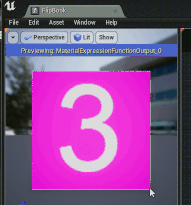Just a little update
I’m using Unreal 4.25 and found out, that a flipbook with e.g. 4x4 works fine BUT a flipbook with 4x2 does NOT work with the “Flipbook Motion Vector” node.
It counts 1…2…7…8 instead of 1…2…3…4…

But the old flipbook node does work:

My test texture:

p.s. @cabalthecatI made a new version for the slate video a while ago:
https://www.youtube.com/watch?v=gkljBc7bdew